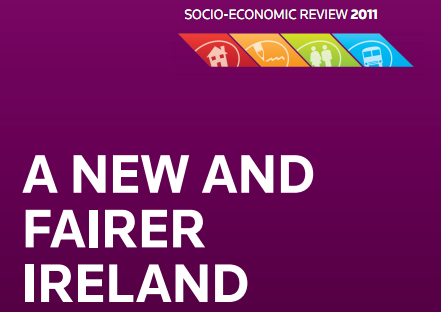"Profoundly wrong" for poor to pay for austerity, says Social Justice Ireland

Flawed analysis and faulty logic have resulted in poor people being wrongly targeted by Government, says Social Justice Ireland in its annual socio-economic review, published today.
Social Justice Ireland has claimed that a combination of flawed analysis and faulty logic resulted in poor people taking a hugely unfair proportion of the burden of Budget adjustments in recent years. In its annual Socio-Economic Review entitled ‘A New and Fairer Ireland’, published today, Monday 16 May, the organisation argues that the Government has failed to acknowledge that improvements in social welfare rates in the mid-2000s were simply a partial ‘catch-up’ for people who had been left far behind while others gained in the preceding years.
They say that this flawed analysis was combined with a faulty logic which justified targeting poor people without realising they were far less able to absorb the ‘hits’ heaped on them. “As a result, the working poor and people depending on social welfare payments have been left without sufficient resources to live life with dignity because of Government’s actions” according to Fr Seán Healy, S.M.A., Director of Social Justice Ireland and one of the three authors of this Review (together with Sr Brigid Reynolds, S.M. and Dr Micheál Collins). “This situation is unjust, unfair and unacceptable and should be reversed.”
The Socio-Economic Review shows that at least 90,000 of those employed in Ireland are at risk of poverty. These are the ‘working poor’. The review describes the government as 'hitting' the working poor in Budget 2011 by reducing their income or increasing their costs. The report describes six initiatives in the Budget that reduced the living standards of working poor households:
- Pulling the working poor into the tax net.
- Introducing a Universal Social Charge the ‘working poor’ must pay.
- Reducing Child Benefit payments.
- Increasing charges for some services.
- Introducing new charges for services that had been free up to then.
- Reducing the minimum wage.
It argues that these initiatives were justified on the basis of a flawed analysis that indicated this group had gained so much when the minimum wage was taken out of the tax net that there was plenty of scope for targeting their income.
Says Healy, “The claim that everybody should make a contribution to the adjustment required in Ireland at present has been repeated like a mantra in policy discussion and public commentary. Yet it is only half true. Yes, Social Justice Ireland agrees everyone should make a contribution insofar as they can. But we do not accept that some people should be driven into poverty because of the contribution that is demanded of them. To do this is to try to solve one problem by creating a deeper and more long-lasting one.
“We reject any attempt to solve Ireland’s problems by increasing inequality or by forcing the most vulnerable members of the population into a situation where they do not have the resources to live life with dignity.
“It is profoundly wrong for example that poor people carry a major burden while senior bond-holders, who carry a large part of the responsibility for Ireland’s implosion, make no contribution to sharing the burden.”
The 254-page Review presents a narrative outlining what happened over recent decades to bring Ireland to where it is today, where Ireland finds itself now, where Ireland should go in the years ahead and what it needs to do to get there. It addresses a number of key policy areas, and proposes policy initiatives that the organisation says are required to develop an Ireland that is sustainable, equitable and a desirable place in which to live.
The full text of the review is available here.
